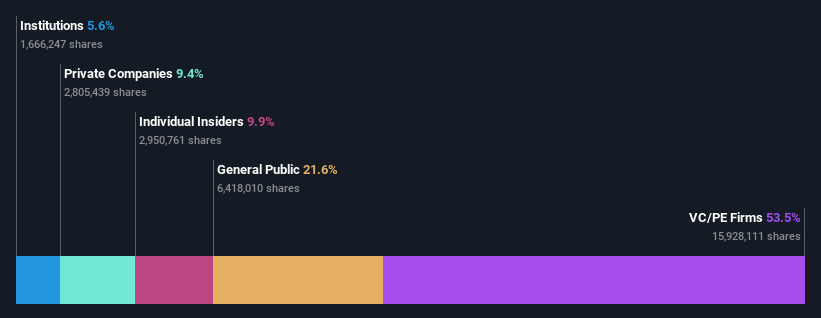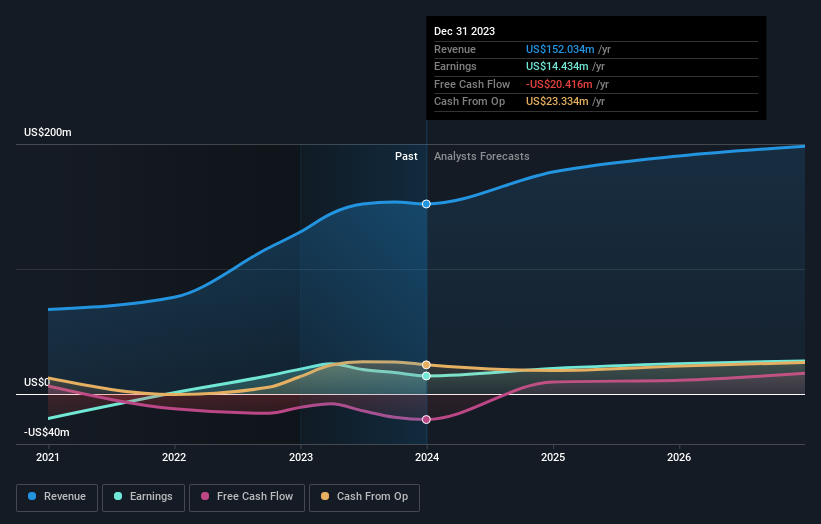Stock Analysis
- United States
- /
- Energy Services
- /
- NasdaqCM:DTI
Drilling Tools International Corporation's (NASDAQ:DTI) market cap surged US$16m last week, private equity firms who have a lot riding on the company were rewarded

Key Insights
- Drilling Tools International's significant private equity firms ownership suggests that the key decisions are influenced by shareholders from the larger public
- The largest shareholder of the company is Hicks Equity Partners LLC with a 54% stake
- Using data from company's past performance alongside ownership research, one can better assess the future performance of a company
A look at the shareholders of Drilling Tools International Corporation (NASDAQ:DTI) can tell us which group is most powerful. The group holding the most number of shares in the company, around 54% to be precise, is private equity firms. In other words, the group stands to gain the most (or lose the most) from their investment into the company.
Clearly, private equity firms benefitted the most after the company's market cap rose by US$16m last week.
In the chart below, we zoom in on the different ownership groups of Drilling Tools International.
Check out our latest analysis for Drilling Tools International

What Does The Institutional Ownership Tell Us About Drilling Tools International?
Institutions typically measure themselves against a benchmark when reporting to their own investors, so they often become more enthusiastic about a stock once it's included in a major index. We would expect most companies to have some institutions on the register, especially if they are growing.
As you can see, institutional investors have a fair amount of stake in Drilling Tools International. This suggests some credibility amongst professional investors. But we can't rely on that fact alone since institutions make bad investments sometimes, just like everyone does. It is not uncommon to see a big share price drop if two large institutional investors try to sell out of a stock at the same time. So it is worth checking the past earnings trajectory of Drilling Tools International, (below). Of course, keep in mind that there are other factors to consider, too.

Drilling Tools International is not owned by hedge funds. Hicks Equity Partners LLC is currently the largest shareholder, with 54% of shares outstanding. This implies that they have majority interest control of the future of the company. Fp Spac 2, LLC is the second largest shareholder owning 9.3% of common stock, and Michael Domino holds about 4.9% of the company stock. In addition, we found that R. Prejean, the CEO has 1.5% of the shares allocated to their name.
While it makes sense to study institutional ownership data for a company, it also makes sense to study analyst sentiments to know which way the wind is blowing. There is some analyst coverage of the stock, but it could still become more well known, with time.
Insider Ownership Of Drilling Tools International
While the precise definition of an insider can be subjective, almost everyone considers board members to be insiders. Company management run the business, but the CEO will answer to the board, even if he or she is a member of it.
Most consider insider ownership a positive because it can indicate the board is well aligned with other shareholders. However, on some occasions too much power is concentrated within this group.
Shareholders would probably be interested to learn that insiders own shares in Drilling Tools International Corporation. In their own names, insiders own US$17m worth of stock in the US$173m company. It is good to see some investment by insiders, but we usually like to see higher insider holdings. It might be worth checking if those insiders have been buying.
General Public Ownership
The general public, who are usually individual investors, hold a 22% stake in Drilling Tools International. While this group can't necessarily call the shots, it can certainly have a real influence on how the company is run.
Private Equity Ownership
With an ownership of 54%, private equity firms are in a position to play a role in shaping corporate strategy with a focus on value creation. Sometimes we see private equity stick around for the long term, but generally speaking they have a shorter investment horizon and -- as the name suggests -- don't invest in public companies much. After some time they may look to sell and redeploy capital elsewhere.
Private Company Ownership
Our data indicates that Private Companies hold 9.4%, of the company's shares. It's hard to draw any conclusions from this fact alone, so its worth looking into who owns those private companies. Sometimes insiders or other related parties have an interest in shares in a public company through a separate private company.
Next Steps:
While it is well worth considering the different groups that own a company, there are other factors that are even more important. For example, we've discovered 3 warning signs for Drilling Tools International (1 is concerning!) that you should be aware of before investing here.
Ultimately the future is most important. You can access this free report on analyst forecasts for the company.
NB: Figures in this article are calculated using data from the last twelve months, which refer to the 12-month period ending on the last date of the month the financial statement is dated. This may not be consistent with full year annual report figures.
Valuation is complex, but we're helping make it simple.
Find out whether Drilling Tools International is potentially over or undervalued by checking out our comprehensive analysis, which includes fair value estimates, risks and warnings, dividends, insider transactions and financial health.
View the Free AnalysisHave feedback on this article? Concerned about the content? Get in touch with us directly. Alternatively, email editorial-team (at) simplywallst.com.
This article by Simply Wall St is general in nature. We provide commentary based on historical data and analyst forecasts only using an unbiased methodology and our articles are not intended to be financial advice. It does not constitute a recommendation to buy or sell any stock, and does not take account of your objectives, or your financial situation. We aim to bring you long-term focused analysis driven by fundamental data. Note that our analysis may not factor in the latest price-sensitive company announcements or qualitative material. Simply Wall St has no position in any stocks mentioned.
About NasdaqCM:DTI
Drilling Tools International
Provides oilfield equipment and services to oil and natural gas sectors in North America, Europe, and the Middle East.
Excellent balance sheet with reasonable growth potential.


